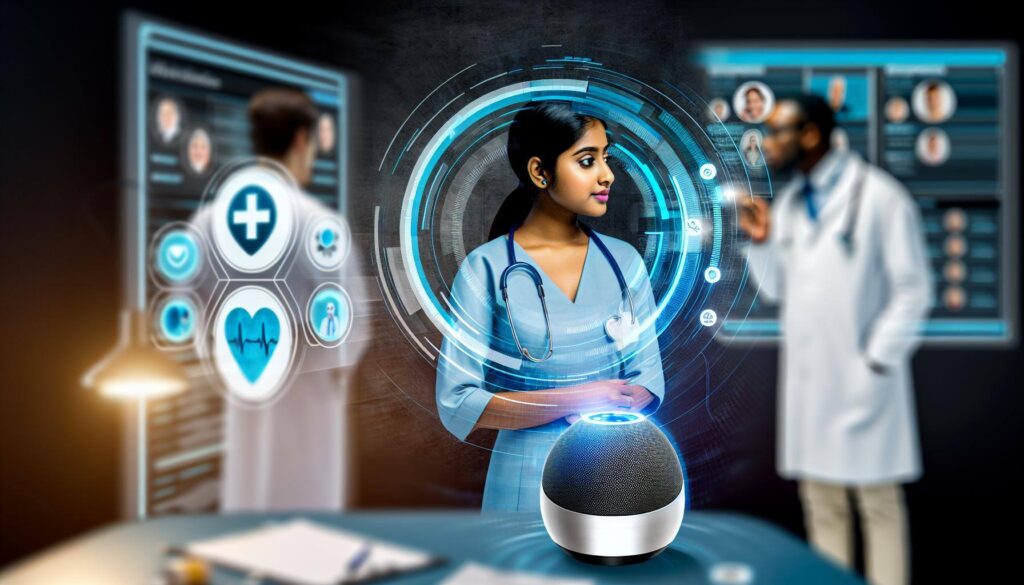Voice technology has become a powerful tool in modern healthcare, enhancing patient care, streamlining workflows, and improving accessibility. AI-powered voice assistants, driven by natural language processing (NLP) and machine learning, are transforming hospitals, clinics, and home healthcare by reducing administrative burden, assisting in diagnostics, and improving patient engagement.
Applications of AI Voice Assistants in Healthcare
1. AI-Powered Virtual Assistants for Patients
- Symptom Assessment and Guidance: AI voice assistants like Ada and Babylon Health analyze symptoms and provide preliminary medical advice.
- Medication Reminders: Smart assistants remind patients to take medication at the right time and in the correct dosage.
- Chronic Disease Management: AI-powered voice systems help patients manage diabetes, hypertension, and mental health conditions.
2. Voice Assistants for Physicians and Healthcare Staff
- Hands-Free Medical Documentation: AI assistants like Nuance’s Dragon Medical One transcribe doctors’ notes in real time, reducing administrative workload.
- Clinical Decision Support: AI systems analyze patient data and provide insights to assist physicians in diagnosis and treatment planning.
- Automated Scheduling and Task Management: Smart assistants coordinate appointments, staff schedules, and patient follow-ups, minimizing delays.
3. AI Voice Assistants in Hospitals and Clinics
- Patient Check-In and Triage: Hospitals use AI-powered kiosks to collect patient information and prioritize emergency cases.
- Voice-Controlled Room Automation: Patients can adjust lighting, temperature, and call for assistance using voice commands, improving comfort and accessibility.
- Nurse Assistance: AI-driven voice assistants reduce nurse workload by handling routine inquiries and patient requests.
4. AI Voice Technology for Elderly and Disabled Patients
- Companion Assistants: AI-powered devices like Google Assistant and Amazon Alexa provide reminders, emotional support, and cognitive engagement for elderly individuals.
- Voice-Controlled Smart Homes: Patients with mobility impairments can control home appliances and request assistance using AI-powered voice commands.
- Emergency Response Systems: Voice assistants detect falls, irregular heartbeats, or distress and alert caregivers or emergency services.
How AI Voice Assistants Improve Healthcare Efficiency
1. Reducing Physician Burnout
- AI-driven transcription and automated medical documentation free up doctors’ time for patient interaction.
- Reducing administrative tasks allows healthcare professionals to focus on critical medical decisions.
2. Enhancing Patient Engagement and Adherence
- Personalized voice reminders improve medication adherence and treatment compliance.
- AI-driven assistants increase patient education and self-care awareness, leading to better health outcomes.
3. Optimizing Healthcare Operations
- AI-powered voice assistants automate billing, insurance verification, and appointment scheduling, reducing administrative delays.
- Smart triage systems prioritize patients based on urgency, improving hospital resource allocation.
4. Enabling Remote and Telehealth Services
- AI voice assistants facilitate virtual consultations, reducing the need for in-person visits.
- Real-time voice translation allows doctors to communicate with patients who speak different languages.
Challenges and Limitations of AI Voice Assistants in Healthcare
1. Privacy and Data Security Risks
- Voice assistants handle sensitive medical data, making them a target for cyber threats.
- HIPAA compliance and end-to-end encryption are essential for protecting patient privacy.
2. Accuracy and Misinterpretation Issues
- AI models may misinterpret accents, dialects, or medical terminology, leading to incorrect guidance.
- Continuous improvements in natural language understanding (NLU) are required to enhance accuracy.
3. Ethical and Legal Concerns
- AI-driven healthcare decisions raise liability concerns—who is responsible for misdiagnoses or incorrect advice?
- Regulatory frameworks need to address AI’s role in clinical decision-making.
4. Integration with Existing Healthcare Systems
- Many hospitals and clinics use legacy software, making AI assistant integration challenging.
- Seamless interoperability between AI-powered voice systems and electronic health records (EHRs) is crucial.
Future of AI-Powered Voice Assistants in Healthcare
- AI-driven diagnostics: Future voice assistants may analyze vocal biomarkers to detect respiratory issues, neurological disorders, or mental health conditions.
- Advanced conversational AI: Future systems will engage in natural, context-aware dialogues, improving doctor-patient interactions.
- Widespread adoption in home healthcare: Voice assistants will become standard companions for elderly and chronically ill patients, enhancing independent living.
AI-powered voice assistants are reshaping healthcare by automating tasks, improving patient experiences, and optimizing medical operations. As AI continues to advance, voice technology will play an even greater role in delivering efficient, accessible, and patient-centered care.
From Our Editorial Team
Our Editorial team comprises of over 15 highly motivated bunch of individuals, who work tirelessly to get the most sought after curated content for our subscribers.


